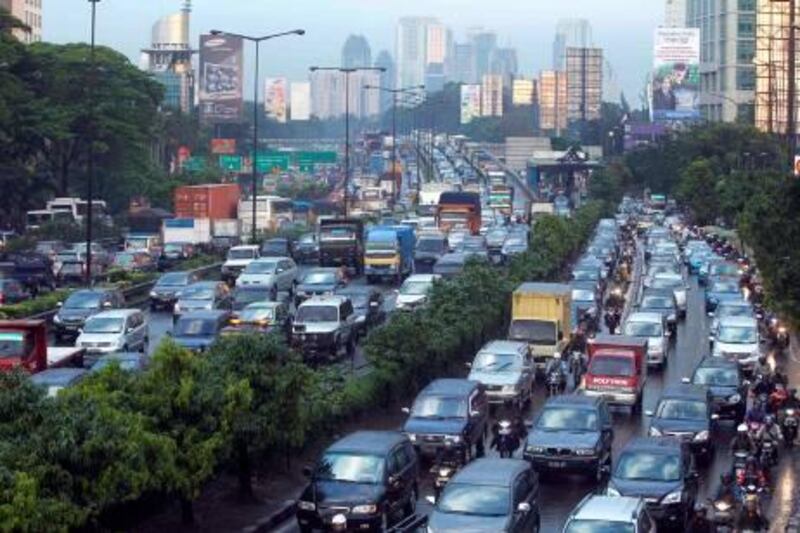JAKARTA // Pangant steps off a bit of concrete in the middle of the road and directly in front of the incoming traffic.
As cars pile up behind his outstretched palm, a driver on the other side of the road does a U-turn, hands over a small banknote to Pangant's colleague and speeds away.
Across the developing world, unemployed poor people find ingenious ways to scratch a living - in Jakarta, which has some of the world's worst vehicle congestion, the "informal sector" has extended into directing traffic.
Men like Pangant, 39, a father of four, create space for cars to manoeuvre in return for tips known as "Pak Ogah", which translates roughly as "hustler".
"It's dangerous work. The traffic is total chaos and very unpredictable," said Pangant, who also works as an "ojek" motorcycle taxi driver.
Pangant works with a crew of 11 others, all related. They arrive at their patch on Tanah Abang street, near a big wholesale market, at 6am and direct traffic in teams of three, working shifts of two hours during which they block traffic for up to 50 customers. The rest of the day they ferry passengers around the city on their mopeds.
The crew's working day ends at 7pm and they depart having made about 100,000 rupiah (US$11.50) each, much of which is spent on food. "We just give our money to our wives and they buy everything," said Pangant, who gave just one name. They also have to offer "smoking money" bribes to persuade the police to turn a blind eye.
"Some people think it's useful," he added. "It's always the rich people who are angry at us. Those we stop also sometimes get angry, but when we see the potential reward, we always step right out. If it's raining we don't get much money because people don't want to open their windows."
About 1.5 million people, or 35 per cent of Jakarta's estimated 4.2 million workers, are employed in the informal sector. More than half of them are women. They sell food from stalls, busk and do whatever they can to earn enough money to survive, according to a report earlier this year from Indonesia's Central Statistics Agency.
"They don't have dreams. They don't know if they are happy or not. They just carry on," said Richo Sinaga, a social worker in the city.
Yet while Pangant, who left school at 14, and the rest of his generation will perhaps spend their entire working lives slogging it out on Jakarta's streets, his children may have more options because of the country's demographics and its growing economy.
The proportion of the city's workforce in the informal sector has decreased from 65 per cent in 2000 as Indonesia's economy has grown. It has shrugged off the global recession and is forecast to grow 6.3 per cent next year, according to the Asian Development Bank.
The world's biggest Muslim-majority nation with a population of about 240 million, Indonesia is on course to enjoy a sustained "demographic dividend" of a high proportion of working-age adults relative both to children and the elderly.
Slowing population growth is making it easier for young people to get jobs. And it will be some time before elderly Indonesians become much of a burden: the 65-plus group is just six per cent of the population today and will only make up 7.5 per cent in 2020. By contrast, the population of Japan is ageing so rapidly that 40 per cent of Japanese are projected to be over 65 by 2050.
Back in Tanah Abang street, Pangant and his crew sit and drink coffee. Bought from Arifin, 25, from a village in West Java who left school at 11, he has a daughter in his home village and is doing a stint in the capital as an itinerant vendor of snacks and drinks.
Although they are at the mercy of the economy and do not make enough when food prices rise, there are also upsides to the life, he said. The team takes care of each other - when one member is sick they chip in with a bit of financial support. Sometimes the temptation to pocket a bit of extra money is too much and arguments ensue, but it is all forgotten after a couple of days.
"I enjoy being with friends," Pangant said. "We are our own bosses. We work as a team and we all know what to do. We don't shout at each other."
His brow darkens momentarily when he discusses what he would rather do.
"If there is a chance, I would do a different job but nothing is possible," he said.
Then he cheers up again.
"I just do this for money. As long as we are not selling drugs or fighting, it's OK. We don't think about tomorrow."
foreign.desk@thenational.ae
Jobless cash in on Jakarta's mega-jams
Traffic jams that plague Indonesia's capital are providing an income for small-scale entrepreneurs, who direct traffic.

Editor's picks
More from the national




